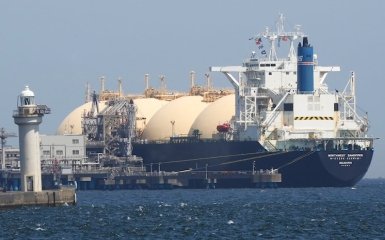As part of the preparation of the 14th package of sanctions against Russia, the EU countries are discussing the introduction of a ban on the re-export of Russian LNG.
What is known about the EU's intentions regarding the ban on the re-export of Russian LNG
It is noted that the largest Russian producer of liquefied gas, PJSC "Novatek", relies on stops in the EU to transport Arctic fuel from ice-class vessels to conventional tankers.
The publication adds that the re-export ban will not hinder LNG supplies to EU countries but will complicate the supply of Russian liquefied gas to Asia.
It is noted that to optimise logistics costs, the Arctic Yamal LNG project managed by Novatek uses the ports of Zeebrugge in Belgium and Montoire in France.
In these ports, cargo is transshipped from 15 ice-class ships to ordinary tankers.
Typically, an arriving vessel is unloaded at the terminal, and a standard LNG tanker is loaded at approximately the same time.
However, if new restrictions are introduced, this will become impossible.
Such stops are important for the Yamal LNG project, as they allow specialized ships to return to the Arctic plant, where conditions do not allow normal ships to operate.
According to these trackings of cargo ships, up to eight Russian cargoes are transshipped in Europe in some months.
During the past year, according to the information of the consultant Energy Aspects Ltd, the import of Russian liquefied gas to EU countries amounted to 14.4 million tons.
Transshipment, where the fuel is transshipped, amounted to 2 million tons.
The ban will result in these additional volumes remaining in the block, in which Russian LNG accounts for about 13%.
How the ban will affect LNG production in Russia
The new restrictions will further complicate the logistics of transporting Russian LNG and force Russian vessels to use longer and more difficult routes.
According to Energy Aspect, the delivery of LNG cargoes from Yamal directly to Asia will increase freight and logistics costs and require longer parking of icebreakers.
However, Russia will also have alternative options.
In particular, Russia usually transships from one ship to another near Murmansk, which could be used to free up the necessary ships.
She can also use the Northern Sea Route in the summer when the ice melts, and various ships can reach the plant.
If alternative delivery mechanisms fail, Russian LNG exports could decline.
Energy Aspects analysts assume that Russian LNG supplies to Asian countries may also decrease or increase in price due to an increase in freight costs.
In the most negative scenario, Novatek will not be able to find alternative routes, and Russian LNG supplies will simply stop.
Europe will terminate the Russian contract for the supply of 3 million tons per year with China.
The use of the Northern Sea Route or the Murmansk crossing will also depend on the ice situation, which will lead to the transfer of supplies to Asia in the second half of each calendar year.
European companies, including German state-owned Securing Energy for Europe GmbH, Shell Plc and TotalEnergies SE, rely on deliveries of Russian LNG from the Yamal LNG project to the ports of Zeebrugge and Montuari.
These contracts do not expire until 2038 and 2041, potentially opening the door for force majeure notices if transshipment is prohibited.




